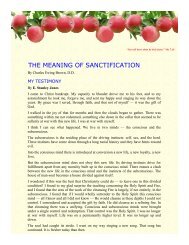W. B. Godbey - Enter His Rest
W. B. Godbey - Enter His Rest
W. B. Godbey - Enter His Rest
You also want an ePaper? Increase the reach of your titles
YUMPU automatically turns print PDFs into web optimized ePapers that Google loves.
oastingly challenged the whole world to meet them face to face and refute their water theology. As I knew the<br />
war had been there, hot and heavy, for more than a generation, and as my preaching would certainly add fuel to<br />
the flame, I deemed it pertinent to cut the work short in righteousness. Therefore I advertised in the secular<br />
papers circulating throughout my district, my acceptance of all the challenges that had been made or should be<br />
made. These debates occupied four to eight days, and great audiences attended and listened spellbound.<br />
My first debate was in Somerset, occupying eight days and afterward at Highland, Lincoln County, with the<br />
same man, Elder Joseph Ballew, who not only boldly advocated all of their water doctrines but denied the direct<br />
influence of the Holy Spirit on the heart, and in one of his propositions affirmed that a sinner had no right to<br />
pray, as that was the prerogative of citizens only and every sinner was an alien until he was immersed for the<br />
remission of his sins – that made him a citizen of God's kingdom and conferred on him the right to petition the<br />
King, I. e., to pray.<br />
I also had a debate of eight days in Mount Vernon, Rockcastle County, with Elder Kelly, and another in Estill<br />
County, with Elder Harding, and two discussions with Elder Briney. These debates at the different places<br />
covered the same ground, they denying and laboring to disprove the work of the Holy Spirit on the heart, the<br />
right of a sinner to pray, and experimental religion, and at the same time enforcing all of their water doctrines<br />
with every forcible argument. They affirmed that Christian baptism is for the remission of sins. I remember<br />
Elder Harding had it written in large, brilliant letters over the pulpit for everybody to see and read, while he felt<br />
sure that he could prove it beyond the possibility of a doubt. As he was in the affirmative, of course the onus<br />
proband, I.e., burden of proof, devolved upon him. With great force and emphasis he delivered his oration,<br />
occupying a solid hour.<br />
Then I followed him with an hour in the negative. As the people had listened spellbound to his entire discourse,<br />
I began by eulogizing it and stating that it was able and edifying and that I had but one objection to it. Then the<br />
people stared their eyes open, thinking that I was just about to get converted to Campbellism, but when I told<br />
them what my objection was, that it was this, that “There is no truth in it,” their countenances fell. I proceeded<br />
at once and had no trouble to make good what I had said and to show clearly that his great and brilliant speech<br />
was actually destitute of truth.<br />
Argument 1. I began on his proposition, “Christian baptism for the remission of sins.” I proved the proposition<br />
false because it is self-contradictory; no one can be a Christian and have any sins to be forgiven, as every<br />
unforgiven person is a sinner and not a Christian. To make the proposition logical, you would have to change it<br />
so as to read, “Sinner's baptism is for the remission of sins. But the trouble in that case is that there is no sinner's<br />
baptism known in the Bible, as baptism is God's mark which He puts on <strong>His</strong> own sheep and never on Satan's<br />
goats. Then I took his arguments in the order in which he had presented them and clearly showed their utter<br />
falsity, e. g., “Repent and be baptized UNTO the remission of your sins,” (Acts 2:38), and not in order to, as he<br />
construed it. Then I showed from Luke's commission, under which Peter was preaching, as Luke wrote both his<br />
Gospel and the Acts as dictated by Paul, (Luke 24:47), that repentance unto the remission of sins should be<br />
preached to all nations in <strong>His</strong> name, beginning at Jerusalem. In both of these passages we have eis aphesin toon<br />
amartioon, unto the remission of your sins. We have this same statement in both passages precisely, while in the<br />
commission Luke does not mention baptism, but only repentance as the condition of remission of sins for all the<br />
heathen world. In Acts 2:38, where your English says, “be baptized,” you have it in the second person plural, coordinate<br />
with repent, whereas the Greek is in the third person singular, and agrees with the distributive pronoun<br />
ekastos. The simple meaning is, “All ye repent unto the remission of your sins.” This takes in the whole<br />
multitude. Then follows, “And let each one of you be baptized in the name of Jesus Christ.” Every pronoun has<br />
an antecedent.<br />
Here the antecedent ekastos – each one – is the subject of metanoiasate – repent. All who repented received the<br />
remission of their sins according to Luke's commission, (24:47). Then each one who had repented and received<br />
the remission of sins, Peter exhorted to get baptized in the name of Jesus Christ, thus publicly confessing Him.<br />
Argument 2. “He that believeth and is baptized shall be saved, but he that believeth not shall be damned.” (Mark<br />
16:16.) This was the basis of his second argument in order to prove baptism for the remission of sins. The<br />
solution of it is very simple and easy. A school boy will readily understand it. The Bible tells us of a baptism for









